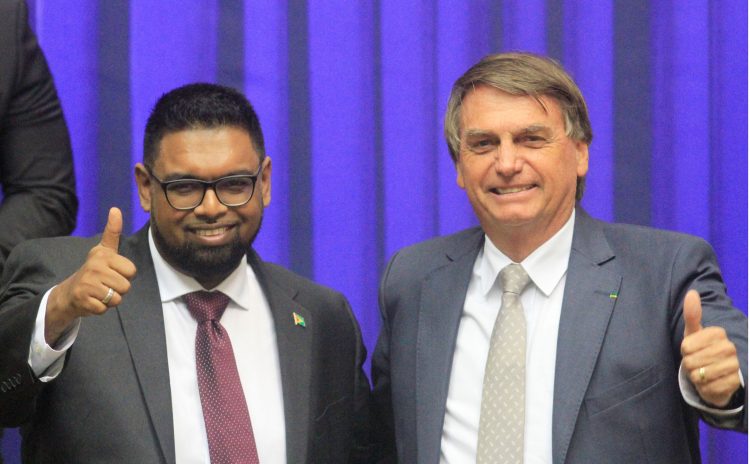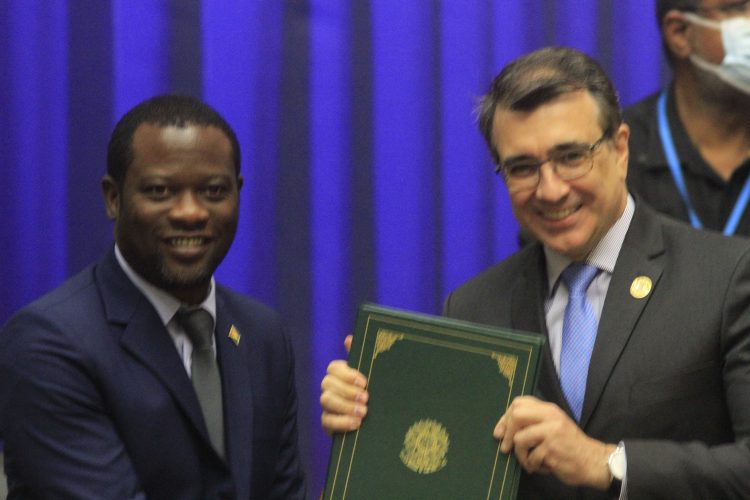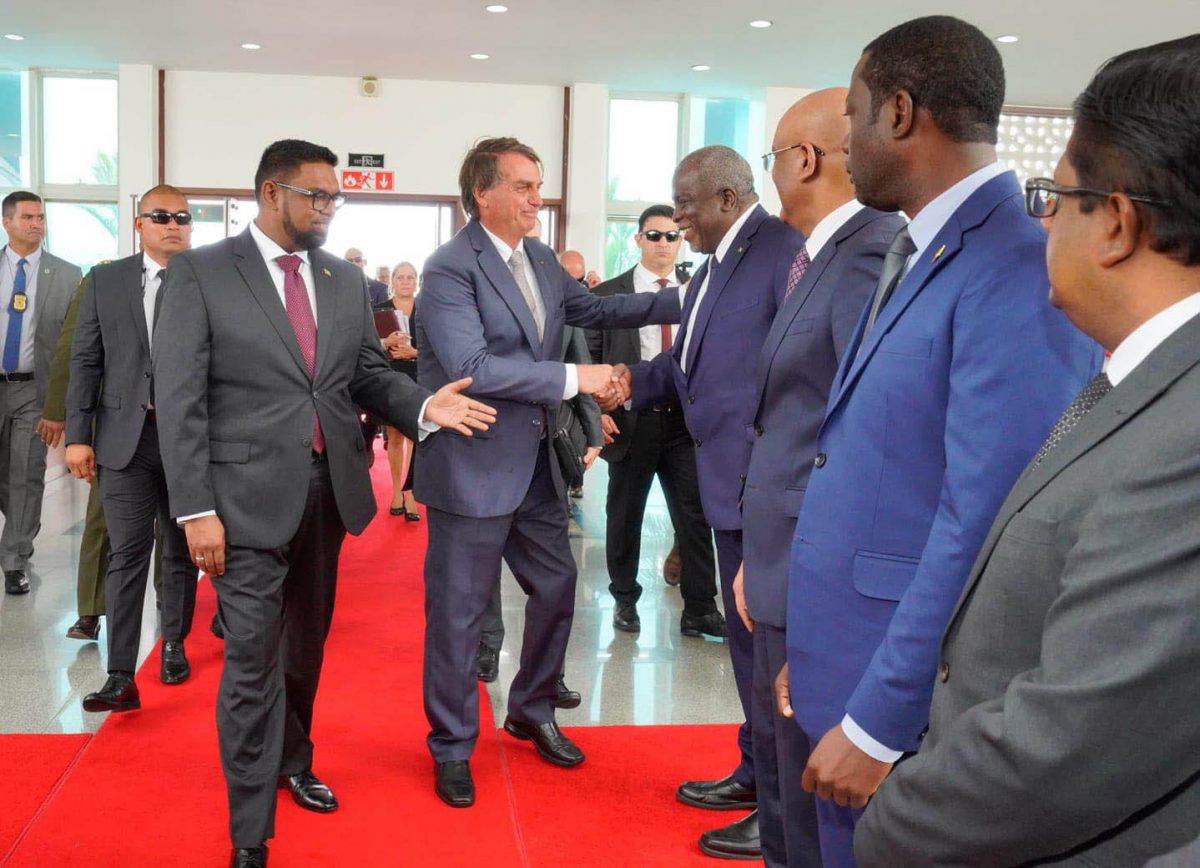-other major infrastructure also under consideration
The feasibility of a road link between Georgetown and the Brazilian city of Boa Vista is under consideration following a brief trip here yesterday by President Jair Bolsonaro and other major initiatives like a deepwater harbour and a rail link were also floated.
Meanwhile, Minister of Foreign Affairs Hugh Todd and his Brazilian counterpart inked two treaties that would see enhanced collaboration on the legal front between the two countries in the area of criminal and civil matters.
The signing occurred at the Arthur Chung Conference Centre, Liliendaal. President Bolsonaro arrived mid-morning yesterday and departed later in the afternoon following a series of meetings with the Guyanese government.


The visit is in response to an invitation from Guyanese President Irfaan Ali to further discussion on a series of areas of cooperation between the two countries.
Todd and the Brazilian Minister of Foreign Affairs Carlos França signed the treaties in the presence of the two Presidents.
The first treaty was on international legal cooperation in civil matters in which the two countries mutually agree to provide full legal cooperation in civil matters which involves civil, corporate, labour and administrative law as well as criminal sentences which seek compensation for damages in the civil courts. While the other treaty was on mutual legal assistance in criminal matters which speaks to both parties providing mutual assistance in connection with the investigation or prosecution of criminal offences including the restraint, seizure or confiscation as well as disposal and return of assets.
The Attorney General’s Chambers and Brazil’s Ministry of Justice and Public Security are responsible for the implementation and execution of the treaties.
During brief remarks following the signing, President Ali said that Bolsonaro’s visit is a continuation of ongoing discussions among the two nations alluding to the recent joint meeting between Guyana, Brazil and Suriname.
Bolsonaro cancelled a previously scheduled trip to Guyana on January 21 this year following the passing of his mother. Bolsonaro had been expected to travel from Paramaribo where he, Ali and Suriname’s President Chandrikapersad Santokhi had held discussions on various matters including the establishment of an energy corridor.
Ali noted that yesterday’s meeting allowed the two presidents to further elaborate and concretize their action plan moving forward. He highlighted four areas of mutual collaboration that were agreed upon during the engagement.
“…those areas [include] food security not only from a Guyana Brazilian perspective but a CARICOM perspective; the issue of energy, energy security, infrastructure and integration of infrastructure; national security and defence; and trade arrangements – expanding our trade arrangement and opportunities [to see] how we better collaborate and work together,” Ali said.
He added “…those were the areas in which we had extensive discussions. We’ve agreed on an actionable framework, in moving forward in all of these areas. On infrastructure development the focus being on that integrated project that involves a deepwater port, the road-rail link, fibre optic connectivity, development of the energy corridor, the creation of a free zone and the linkage of natural resource development to this project. So, we are not only talking about the deepwater port and isolation of these things, it is now one integrated project that we are looking at and we agreed to establish a team that will comprise of investors, the federal government of Brazil, the Government of Guyana [and] the state of Roraima and define the time path through which we will move this project forward in an accelerated way.”
President Ali said that on the energy front, the two leaders decided on working together on natural gas strategy and how that can be integrated into the development of Brazil. He added that the potential of hydropower was also discussed.
“We also discussed areas that we can seek cooperation in oil and gas. The experience of Brazil in the management of the oil and gas industry itself is immense,” the Guyanese head of state related.
The two leaders also discussed the incorporation of technology in their security infrastructure according to President Ali. He noted that Guyana and Brazil would be coordinating efforts in the area of security and defence using hardware and software technology which includes intelligence sharing as a security master plan. Ali explained that they stand to benefit as they enhance their security architecture and look at ways in which they can deploy technology and a joint approach to securing borders.
The Guyanese President reminded that agriculture remains one of his government’s biggest priorities and in the discussion with his Brazilian counterpart, agriculture and agro-processing was a prominent part. He explained that the two countries decided on a team to work on a plan to expand markets while addressing the removal of trade barriers. The team is also tasked with examining the creation of a hub for agro-processing and transshipment of produce and products to the rest of the CARICOM market.
“Agriculture is a major area that Guyana is pursuing [and] all of this is linked intricately in our trade arrangement and agreements. So we have been able to frankly discuss these issues and work out the mechanism through which all of these areas will advance,” Ali said.
The two Presidents agreed to pursue greater collaboration in the area of agriculture and food security, through the sharing of information and best practices, enhanced collaboration between their respective research institutions, and the promotion of investment. President Ali invited Brazil to partner in the advance of the CARICOM Agri-Food Systems Agenda with the aim of contributing to enhanced food and nutrition security in the region.
Meanwhile, Brazil’s Bolsonaro said his country has taken steps to ensure that it becomes self-sufficient in a few years adding that it will be in a position to export wheat to the rest of the world. He informed that his government has been establishing wheat fields in the State of Roraima.
“…it’s a situation that really leaps at the eye given the climate conditions up north but the technology developed by the Brazilian Agricultural Research Organization has proved to be a totally doable reality in this neighbouring State of Roraima in northern Brazil,” Bolsonaro said through an interpreter.
He also encouraged the Brazilian business community to invest in Guyana adding that his government will be looking at ways to further incentivize investments here.
“…so our visit here has been very promising for our countries and our peoples. Guyana has a bright and promising future ahead, especially given its major oil and gas potentialities but also because of the way your government has fostered closer and closer relations with Brazil. We are and stand as partners and I’m quite certain that, Mr President, fruits will be reaped as a result of this visit of our meeting of ours today,” Bolsonaro commented.
Bolsonaro, since taking up the presidency has been criticised for his government’s track record, particularly, on the environment and rights of indigenous peoples. Bolsonaro has consistently relaxed environmental laws to allow for increased destruction of the Amazon rainforest. The latest report from Brazil’s National Institute for Space Research (INPE) shows that some 941.34 square kilometres of the forest have been destroyed within the first three months of 2022. That is a significant increase from the comparative period.
Bolsonaro’s government also recently tabled legislation to allow mining on indigenous lands which has seen a widespread backlash. Brazil’s indigenous peoples have been protesting the violation of their rights by Bolsonaro’s administration and some activists have also been murdered by persons dissatisfied with the protests.
Additionally, with Brazil scheduled to elect a new government on October 2, his government has already been making claims and pushing conspiracy theories about electoral fraud and irregularities.
Guyana’s recent track record on the environment has also not been a clean one. Both the Environmental Protection Agency and the Environmental Assessment Board have been accused of being puppets owing to questionable decisions made in recent months. The EPA has been consistently granting approval for various projects without requiring environmental studies and decisions are often reinforced by the EAB – which is comprised of three government employees.
Both the EAB and EPA are legally mandated to be the nation’s environmental watchdogs but have remained silent when glaring irregularities are pointed out to them.
Additionally, though the country is ramping up oil production while the world is moving away from fossil fuels, the government remains adamant that its carbon sink status will not be affected by its oil and gas sector.
Collaborative agenda
In a joint statement, the two Presidents decided to establish a bilateral working group with the task of assessing the potential gains of a Boa Vista-Georgetown road corridor in terms of trade and investment flows, as well as identifying possible needs for technical assistance and potential private partners and international financial institutions that could contribute to the initiative.
The working group has been given up until the third quarter of 2022 to realize the full implementation of the Guyana-Brazil International Road Transportation Agreement. They agreed to advance the process of implementation of the Memorandum of Understanding (MoU) signed in November 2020 for the Technical Feasibility Studies for the installation of a fibre optic link between Guyana and Brazil.
The possibility of a rail link was also raised in light of plans for the deep-water port and future road corridor development.
Ali and Bolsonaro also ratified the importance of collaboration in the field of electrical interconnection between Brazil, Guyana, French Guiana and Suriname, and encouraged the Inter-American Development Bank to proceed with the new phase of the technical, economic and environmental feasibility studies, under the Memorandum of Understanding signed in 2019 by that institution and the energy companies of the interested countries.
Brazil was also invited to invest in the development of Guyana’s bauxite sector as a means of furthering the clean energy sector.
The Presidents also concluded negotiations on the treaty on the transfer of sentenced persons between Guyana and Brazil, an inter-institutional cooperation agreement between the Guyana Police Force and Brazil’s Federal Police of the Federative Republic for the exchange of information on public security, prevention and fight against organized crime.
Those treaties will be signed soon.
They also committed to the strengthening of regional and hemispheric institutions, including the Amazon Cooperation Treaty Organisation, the Forum for the Progress and Integration of South America and the Organisation of American States.






